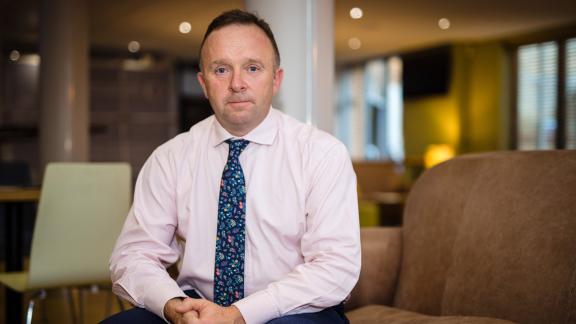Welsh NHS Confederation Annual Conference and Exhibition: What next?

The Welsh NHS Confederation Annual Conference was a very popular and well supported event again this year, with a turnout among delegates and exhibitors exceeding that of previous years.
We'd like to say a huge thank you to all members, delegates, speakers, session sponsors and exhibitors who helped make our annual conference, exhibition and pre-conference dinner so successful. A special thank you again to our event partners Amazon Web Services, ABPI Cymru Wales and Novartis UK for helping us make the event possible, and for MHA / Baker Tilly and Amazon Web Services for sponsoring our pre-conference reception and dinner.
We heard thought-provoking speeches from Wales’ Cabinet Secretary for Health and Social Care Jeremy Miles MS, Dr Sabrina Cohen-Hatton and our chief executive Matthew Taylor to name a few. With multi-sector panel sessions across a range of topics and engaging debates in the newly introduced ‘open exchange sessions’, there’s plenty to build on for the Welsh NHS Confederation’s ongoing programme of work.
We need a change in mindset, with leaders creating the conditions to accelerate change across organisational boundaries.
In his first conference address as Cabinet Secretary, Jeremy Miles MS focused on two key themes: performance and how we support the NHS across the UK to adapt and share good practice. Given the significance of performance (access, waiting times etc) to the public, politicians and the media, it’s no surprise that this continues to be top of the Welsh Government’s agenda. However, there’s a noticeable shift in narrative when it comes to supporting and learning from the ‘NHS across the UK’. The phrase ‘adopt, adapt or justify’ was put forward as a key principle for the Welsh Government’s approach to the NHS. Someone suggested to me the alternative “learn and spread” might be a more valuable phrase.
We must be brave in being transparent about what is needed to achieve a healthier population, more resilient communities and sustainable services.
The need to change – the need for transformation – is a not a new concept for the health and care system. We all know it’s necessary. We have a good idea of what we want things to look like, and an idea of how we get there (although our ideas around this may differ from one person, organisation or sector to another). But what resonated with me from the day was how we tackle some of those barriers to change, transformation, innovation, doing things differently – however we want to word it. How we need to be open to new approaches. But there’s more to it than that: it’s cultural, even systemic, in nature, and needs to be role modelled by leaders, both in the health service, by Ministers and the wider public sector. We need a change in mindset, with leaders creating the conditions to accelerate change across organisational boundaries.
As our chief executive Matthew Taylor pointed out, we have to make our societies work for the people who live in them. Rather than asking “How do I get all of these people to do what I want them to do?”, we must ask “How can I help all these people do what they want to do?”. We must be brave in being transparent about what is needed to achieve a healthier population, more resilient communities and sustainable services.
As Ruth Jordan, our expert speaker in the open exchange session on realising the full potential of innovation, highlighted: Fear is a common emotion that inhibits creativity, innovation and spread. Fear of doing something wrong. Fear of getting into trouble. Fear of failure. This means being comfortable with not knowing and uncertainty. It means routinely seeking out the perspectives of those most impacted by the problem and really listening to them. Finally, it means demonstrating the bravery and courage to share stories and build something new. “If you can be brave, then those around you will be too.”
We cannot wait for transformation to happen to the system. Leadership needs to be brave and willing to take a risk.
These sentiments were echoed in Dr Sabrina Cohen-Hatton’s personal and thought-provoking speech. Sabrina talked about the need to cultivate the psychological safety to allow others to try and fail, focusing on how we learn from failure. She reminded us that, as individuals and leaders, we don’t realise how much of an impact we have on others, and our responses and behaviours are key to creating this culture of psychological safety. This in turn creates an inherent permission to try.
We cannot wait for transformation to happen to the system. Leadership needs to be brave and willing to take a risk. We know the key barriers to change – time, resource, culture, comfort with the status quo (or fear to move away from it), the need for buy-in, short-term funding pots and so on.
As highlighted in ABPI’s breakout session, we must also learn from and work with partners across sector boundaries, including with industry. How many things happened during the COVID pandemic because they had to? And how many went back to how they were? One speaker said: “A crisis convenes and focusses effort and there should be a sense of crisis in health and care right now.” As well as working as One Welsh Public Service, and across the public/private sector boundary, we must also ensure the patient and citizen voice is consistently present throughout the journey.
If we don’t fix health and social care, it will continue to need more resource, which could be used for other important, preventative policy areas. As we heard, the demographic challenge is not just the ageing population in itself, but more people getting sicker, younger. We must place health protection and improvement at the heart of all policy. This is mission critical.
We hope those who attended WelshConfed24 found it inspiring, thought-provoking and a valuable opportunity to connect with contacts old and new. Keep an eye out for our future webinars, many of which will build on the conversations started at our annual conference.
A final thank you must go to my team at the Welsh NHS Confederation for their hard work, creativity and determination to deliver the event. It’s not too late to give us your feedback and suggest ideas for follow up events.



